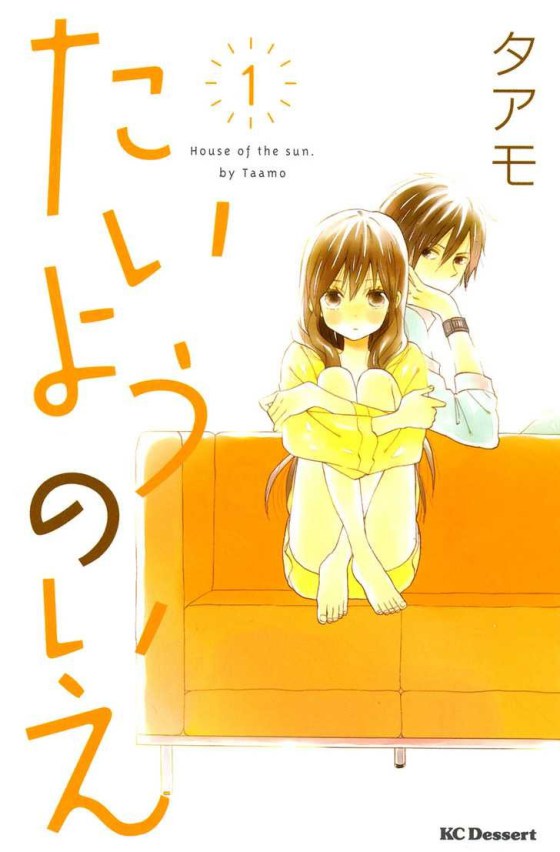Hello, everyone.
I have been away for a while (again!), attending university, writing midterms, attempting to learn Mandarin Chinese, and applying for internships in various places. But I’m back now! I really want to thank all of you who commented while I was away. You guys really give me so much motivation to blog, and reinforce my vision for this blog – a shoujo manga blog with a unique sense of commentary. Thank you all so much!
Getting back to the matter at hand…this is a manga that I absolutely love, and have loved for a pretty long period of time. It’s a manga I genuinely enjoy rereading, and one that I’m sure you’ll all enjoy too. Its recent updates have been very satisfying, and I’m very happy with the direction the series has taken in the past, and am optimistinc about the direction the author will take the series in the future. Here’s a look at Taiyou no Ie.
Summary: Mao hasn’t had the greatest relationship with her family since her father remarried, but despite his outward personality, she still loves him and wants his approval and love. But when Mao is suddenly told that she doesn’t need to come home anymore, where is she supposed to go? Thankfully, childhood friend (and crush) Hiro is willing to offer her a place to stay, along with the warm family she has always wanted. However, the return of Hiro’s younger sister Hina to the family home means that Mao and Hiro must eventually be separated. Will Mao every reconcile with her father? And will Mao’s love for Hiro ever be realized?
Thoughts so far:
I really love this manga. I really do. It’s one of the main series of late that I look forward to reading as far as updates go. As to why I really love this manga, it’s really a matter of how strong the writing is. The premise of this series isn’t exactly a new one, but the character interactions are really what set this series apart from the rest.
Mao is quintessentially tsundere – so tsundere in fact, that one chapter makes a brief joke about this personality trait of hers. What I like about characterizing Mao this way is that it makes sense in relation to Mao’s past. Because of the fact that her family wasn’t a close one, it’s plausible that she wouldn’t be forthcoming with her true emotions and motivations for fear of rejection. With this in mind, when I read the series and analyze Mao’s words, I don’t feel as though Mao’s character is being manipulated to elicit a certain reaction in the otaku readership, but it’s a genuine reflection of the effects of Mao’s past on her personality.
I like Hiro. I like the fact that he acts his age (he’s 23), and he’s not written to be more happy or more immature. He reads like the product of his circumstances, and it doesn’t feel forced. I appreciate the fact that he tries to be authoritative when it comes to Mao and her curfew, but isn’t too strict given their small age difference. Perhaps most importantly, I like that he isn’t depicted as this fault-less figure that’s been present throughout Mao’s life, and that he is flawed and has his own emotional struggles; while the author paints this portrait of Hiro, he isn’t written as a tortured hero, either. Rather, he’s a real, fallible adult that struggles with the desire to achieve his goals and his inability to do so.
I think one of the central themes of this manga is the illusory nature of authority figures. Hiro has more life experience than Mao, and yet he has his own issues that he struggles with, and worries about difficulties with reuniting his family. But the most illustrative example of this is actually Mao’s father. As her father, he is supposed to be her caregiver and protector, and yet he willingly abandoned Mao when the opportunity to do so presented itself. What these examples demonstrate is that age equalling authority is an illusion – both of these people, despite their age, are far from perfect. In fact, Hiro, despite being younger than Mao’s father, is actually a much better at caring for Mao’s emotional needs than her father ever was.
I guess what I like so much about this manga is that it kind of destroys the perception of parents and people of authority in young people’s lives as these all-knowing, infallible figures. Other shoujo manga do this, depicting parents in an unforgiving light, but it makes the parents seem more like caricatures than real people. What Taiyou no Ie manages to do is show that Mao’s parents aren’t perfect, and outlines all of the reasons (some justifiable, some not) that led to their willingness to abandon Mao, managing to do so without bashing them or making them too unsympathetic, even managing to give Mao’s father (a character I was determined to hate) a few redeeming qualities.
The art is cute. TAAMO is a good artist, and (he? she? I checked TAAMO’s official website, and couldn’t find any information relating to gender. Help!) TAAMO’S other manga look great too. Some of the character art is a bit inconsistent though – some characters are drawn better in some panels than others. However, the series as a whole looks great, and I’m willing to classify TAAMO’s art as one that I genuinely enjoy.
In short, go find Taiyou no Ie and read it. Right now. Because the love story isn’t the sole focus of the manga, I think that this is a series that can be accessible to a variety of readers. I personally can’t wait to see the direction this series goes in next. If the most recent chapters are any indicator, this series is going to be a great read! Go check it out!
Score so far: 9/10
![]()
(c) THAT Shoujo Manga Blog ? – Read entire story here.

